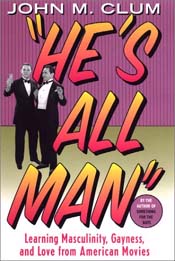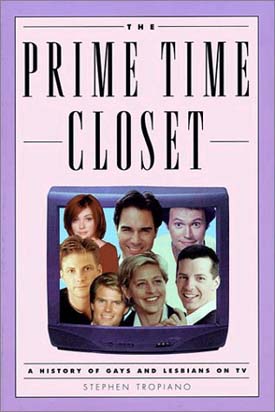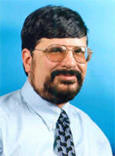
|
The Book Nook The Prime Time Closet: A History of Lesbians and Gays on TV, by Stephen Tropiano; Applause Theater & Cinema Books; 340 pages; $16.95.
In spite of all the accusations on the part of alarmed moralists, the presence of gay, lesbian, bisexual or transgender characters on television shows is still novel enough to merit attention, as in W&G, QAF or Six Feet Under. Furthermore, since straight audiences still choke at the sight of gay affection, gay characters on network TV are often devoid of any emotional or sexual lives, as is the case with Will Truman (Eric McCormack) of Will and Grace and Matt Fielding (Doug Savant) of Melrose Place. The Prime Time Closet: A History of Gays and Lesbians on TV, covers a half-century of LesBiGay and Trans images on television, from the uncertain beginnings to the age of Ellen, Oz and Buffy the Vampire Slayer. It follows in the footsteps of Alternate Channels: The Uncensored Story of Gay and Lesbian Images on Radio and Television by Steven Capsuto. But while Capsuto covered his subject chronologically, Stephen Tropiano divided his Prime Time Closet by genre: the medical drama; law and order drama; dramatic series, mini-series and movies of the week; and situation comedy. Other genres, such as daytime TV, talk shows, news shows or documentaries, are also discussed, but not as thoroughly. For example, "reality TV", an important genre that has contributed greatly to television's coverage of gay people - think An American Family, Real World or Survivor - is relegated in this book to a box placed at the end of the chapter on dramatic series. Except for these limitations - and a few inevitable errors here and there - The Prime Time Closet covers its subject well. In spite of its inadequacies and reservations, TV has come a long way in its coverage of sexual minorities, and Tropiano shows us how the ups and downs have gone mainly up. (Dawson's Creek's Jack McPhee is a vast improvement over Melrose Place's Matt Fielding, now matter what else you might say about their respective series.) TV trivia buffs will enjoy the lengthy Appendix, which features a "Gay/Lesbian/Bisexual/Transgender TV Episode Guide", "The Best of the Prime Time Closet", a Bibliography and other resources.  He's All Man: Learning Masculinity, Gayness and Love from
American Movies by John M. Clum; Palgrave; 222 pages; $26.95.
He's All Man: Learning Masculinity, Gayness and Love from
American Movies by John M. Clum; Palgrave; 222 pages; $26.95.
In Widescreen Dreams: Growing Up Gay at the Movies, Patrick E. Horrigan wrote that "We as gay people find ourselves enmeshed in a culture that studiously ignores us or radically misrepresents us; thus, in order to compensate for what the culture withholds from us, we appropriate it (in fantasy, in subculture) and make it say what we need it to say." Many of us have a cinematic "moment when movies and my life coalesced". For me, it was the nude wrestling scene between Oliver Reed and Alan Bates in Women In Love (screenplay by Larry Kramer). For young John M. Clum, it was Walk the Proud Land, a western starring Audie Murphy as John P. Clum: "I remember going to the premiere of Walk the Proud Land and thinking that Audie Murphy had made my great-granduncle not only interesting (to me, at least) but, as well as I understood such things at age fifteen or so, downright sexy." Studies of homosexuality in the movies have ranged from Vito Russo's ground-breaking Celluloid Closet to David Ehrenstein's Open Secret and William J. Mann's Behind the Screen. In He's All Man: Learning Masculinity, Gayness, and Love from American Movies, Clum, a recognized authority on gays in the theater, fails to give gays on film the same thorough treatment that made Acting Gay and Something for the Boys: Musical Theater and Gay Culture standards in their field. Still, Clum covers a wide range in his study of "masculinity, gayness and love" in American film, from Little Caesar, Red River and Rope to Urbania, Swoon and Queer as Folk. You might even find your own cinematic moment in this book. CHARLES HENRI FORD, poet, novelist and editor, recently died at the age of 94. In 1933 Ford and his friend Parker Tyler collaborated to write The Young and Evil, which Ford's obituary wrongly called "the first gay novel". Even so, The Young and Evil was a milestone in the history of gay literature - it was 74 in my list of the top 100 gay books of the 20th century - and a model for everything that came after it. Ford was also an important Surrealist poet and the editor of View, the premier art and literature magazine of the 1940's.
|
|
 A couple of years ago, when Will and Grace and Queer as Folk won the
GLAAD media awards for best gay comedy and best gay drama respectively, a
comic on Saturday Night Live quipped that they were the only nominees in
their respective categories.
A couple of years ago, when Will and Grace and Queer as Folk won the
GLAAD media awards for best gay comedy and best gay drama respectively, a
comic on Saturday Night Live quipped that they were the only nominees in
their respective categories.
 Jesse Monteagudo is a freelance writer and book lover who lives with
his domestic partner in South Florida. He can be reached at
Jesse Monteagudo is a freelance writer and book lover who lives with
his domestic partner in South Florida. He can be reached at